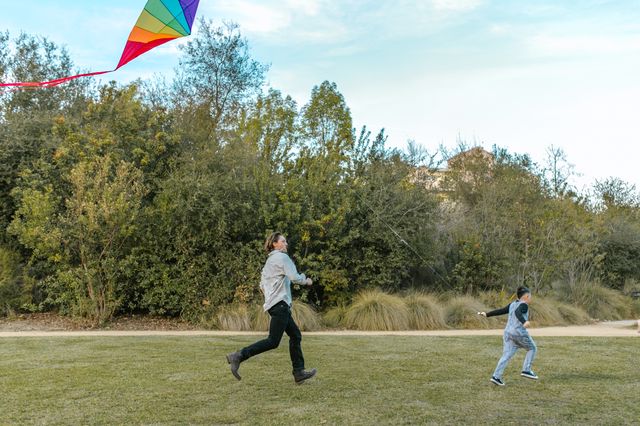I was six years old, and it was my first solo effort at one of my favorite activities: flying a kite. Up to this point, I had been under the careful guidance of my dad and my older brother. The diamond-shaped kite was made of yellow paper with a cloth tail hanging from the bottom. In my hand I held a new roll of string, tightly wound around a cardboard cylinder.
The wind was right, and the kite took off effortlessly. As I let out the string, I realized I was in complete control, so I decided to go for broke. I would let out the entire roll of string. I held the cardboard cylinder between my two fingers and let the string unwind at its own pace. The kite became a tiny yellow speck in the sky. The horror began as I reached the end of the string.
No one told me, and I didn’t think to ask, that the string was not attached in any way to the cardboard cylinder. I stood in disbelief as the end of the string left the roll and flew into the air. The disbelief turned to terror as I watched my kite sink slowly to the ground, far beyond my reach. I didn’t know it at the time, but I had just received my first object lesson about a biblical understanding of freedom.
Freedom is always a popular topic this time of year, as we approach another Independence Day. Freedom has been a popular topic since the days of 9-11, when that freedom seemed to be in peril. As is often the case, something that we take for granted becomes something we talk a lot about when it is challenged and under attack.
In the days immediately after the 9-11 attacks on New York and Washington, ex-Beatle Paul McCartney penned an anthem with the simple title of “Freedom.” I call it an anthem, because it became just that, and he sang it over and over, as a nation struggled with their pain, hurt, anger, and confusion. One of the lines in the song, repeated over and over, is “Freedom, talking about freedom. I will fight for the right to live in freedom.” However, McCartney didn’t do much talking about freedom; he simply repeated the word over and over in a song.
But it is not unusual for the idea of freedom to be discussed in many settings and in many ways. That discussion has continued to this day. We are told by our political leaders, for example, that every war is fought to protect our freedom and to provide the opportunity for the citizens of another country to experience the wonder of freedom. Perhaps you have heard this same political leader declare that freedom is the special gift of God and that we must do all that we can to assure that this special gift is shared with all of humanity.
And yet, what exactly are we talking about when we talk about freedom? Do we need to unwrap this “gift of God” and see what’s inside? There is a lot of talk about personal freedom. There is a lot of talk about political freedom. But long before freedom was a political concept or a personal concept, it was a theological, religious, and spiritual concept.

But before we go there, let’s consider these other expressions of freedom. We can begin with political freedom. This is the “freedom of Braveheart, the freedom that was at stake in the American Revolution–that is, Jefferson’s, Franklin’s, and Washington’s freedom, and by extension, the freedom sought by Rosa Parks and Martin Luther King Jr.” (Reinhold Rutter, “Bound to be Free,” Christian Century, 8-10-2004, 24). This is the freedom that has to do with the civil liberties guaranteed to us by the Constitution: freedom of speech, freedom of assembly, the right to bear arms, freedom of the press, and freedom of religion. This is the freedom that has to do with the inalienable right to life, liberty, and the pursuit of happiness.
This political freedom is the freedom that was leads us to go to war when it is threatened. To be sure, this kind of freedom is priceless, and the liberties it gives are to be cherished and defended. But too often our understanding of freedom does not go beyond political freedom. And when this political freedom is identified as the great gift of God for humanity, that may be claiming too much.
Beyond political freedom, there is personal freedom. This freedom is “the capacity we have to make choices: where we live, what sort of education to pursue, whether or not to marry, and what kind of work to do. We make up our mind about public issues, support whatever political candidates we think are best, and contribute to whatever causes make sense to us (Guy Sayles, “Vocabulary Lesson: Freedom”, Sermon, First Baptist Church, Asheville, NC, 8-29-2004).”
This personal freedom is based on a picture of every person as an autonomous and sovereign self. We have the right, and hopefully the ability, to choose what we want, what is best for us. Freedom means living out whatever we want, whatever we desire, whatever drives us. To be sure, there are limits. We cannot do whatever we want at the expense of others. But even these limits are not imposed on us by some external authority. Instead, they are limits that we recognize and choose to accept and honor.
Like political freedom, this personal freedom is inviting and precious. And yet, it is also easy to equate this freedom with the freedom that is the gift of God to humanity. But I wonder, especially when I hear the ways we talk about this kind of freedom. Personal freedom is something that we establish and it is something that we defend. Again, there is nothing wrong with this understanding of freedom, but it does not seem to fit with the idea of freedom as a gift, from God or anybody else.
So what is freedom from a theological, religious, and spiritual point of view? Well, maybe the best way to answer that question is to return to my story of the kite (you were probably wondering when I would get back there). The whole time I held the string firmly in my control, standing there on the ground, the kite soared and danced in the wind. When the end of the string left the cardboard cylinder, no longer anchored to the ground, the kite flew out of control and fell to the ground, wobbling weakly all the way down.

You see, all my life I believed that it was the wind that makes the kite prance across the sky. But now I know that the only way for a kite to soar freely in the sky is to be firmly under my control on the ground. There is the paradox: To fly through the air, to be free to soar, the kite has to be grounded.
And so it is with a spiritual understand of freedom. Most of us think of freedom as the ability to prance and soar and skip through the air, twisting and turning like a bird in flight. But freedom, true freedom, biblical freedom, is also about being anchored and grounded. As a Christian, the anchor that I choose for my life’s flight is the constant and abiding presence of God as revealed in the person of Jesus Christ.
It is that sure and steady and guiding presence that offers me the chance to dance through life. To be sure, this line that ties me to the ground may feel limiting and restrictive at times. I want to soar even higher, and that desire tempts me to cut the line, the connection to this grounded relationship with God. But when I do, this unlimited freedom can result in a twisting and churning as I plunge to the earth. The flight is over; the dance has ended. And all I am left with is my unbounded freedom.
And so, freedom can become binding, and even enslaving, when it is focused almost exclusively on ourselves. Today we live under a false idea of freedom which proclaims that when I am mature, I am free to do anything for my own self-fulfillment. Now that sounds noble enough. And it sounds even nobler when we say that we want the same thing for everyone else. And we reach the height of nobility when we say that this understanding of freedom is a gift from God.
From a Christian perspective, we are called to be more than free. We are called to be faithful. We are called to be faithful to this God who has initiated a covenant relationship with us. From this calling to be faithful, as Christians, we will live in the tension between being faithful and being free.

The Bible speaks of being free from sin, but immediately goes on to speak of being slaves to righteousness. The message of God that Moses spoke to Pharaoh was more than, “Let my people go.” Instead, the message of God that Moses spoke to Pharaoh, and the Hebrew people, was “Let my people go, so that they may go into the wilderness and serve me.”
The freedom of a called people goes well beyond the descriptions of political and personal freedom. Scripture rarely speaks of freedom from displeasure, suffering, or hardship. It rarely speaks of freedom to do what we want, get what we can for ourselves, or attain a place in life for ourselves.
“Freedom, talking about freedom.” There is a lot of talk about freedom in our society and culture. But, for Christians, there is a larger category and concept than freedom. Beyond freedom, there is grace. There is the grace to dance, to prance, and to soar through life. But all of these grace-filled actions are possible only as we are grounded in an inviting faithfulness to the God who loves us and calls us to be God’s hands and feet in this world that God created and cherishes.
